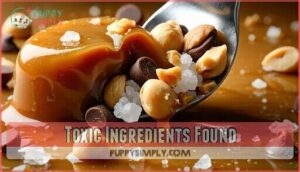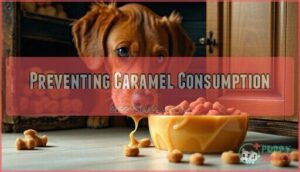This site is supported by our readers. We may earn a commission, at no cost to you, if you purchase through links.
 No, you shouldn’t let your dog eat caramel. This sticky sweet treat packs way too much sugar and often contains dangerous ingredients like chocolate or xylitol that can poison your pup.
No, you shouldn’t let your dog eat caramel. This sticky sweet treat packs way too much sugar and often contains dangerous ingredients like chocolate or xylitol that can poison your pup.
Think of caramel as a triple threat – it’s loaded with sugar that can upset your dog’s stomach and lead to pancreatitis, the gooey texture creates choking hazards, and those hidden toxic additives can turn a simple snack into an emergency vet visit.
Even "plain" caramel without additives isn’t safe because the sugar overload can trigger serious health problems. Your furry friend deserves better than this sugary nightmare, and there are surprisingly simple ways to satisfy their sweet tooth safely.
Table Of Contents
- Key Takeaways
- Dangers of Caramel
- Can Dogs Eat Caramel
- Health Risks Explained
- Toxic Ingredients Found
- Alternatives to Caramel
- Preventing Caramel Consumption
- Safe Treat Options
- Frequently Asked Questions (FAQs)
- Can dogs have a little caramel?
- Will one piece of candy hurt my dog?
- Can I give my dog a piece of caramel popcorn?
- Can dogs eat Werther’s caramel?
- How can I tell if my dog has eaten caramel?
- Are there any benefits to giving my dog caramel?
- How can I tell if a treat is safe for my dog?
- Is there an alternative to feeding my dog caramel?
- How much caramel causes poisoning in dogs?
- What are symptoms of caramel overdose?
- Conclusion
Key Takeaways
- Don’t give your dog caramel – it’s packed with dangerous levels of sugar that’ll cause stomach upset, pancreatitis, and long-term health problems like obesity and diabetes.
- Watch out for toxic ingredients hiding in caramel like xylitol, chocolate, and macadamia nuts that can cause liver failure, seizures, and life-threatening emergencies requiring immediate vet care.
- The sticky texture creates serious choking hazards and clings to your dog’s teeth, accelerating tooth decay and making dental problems worse over time.
- Choose safer alternatives like fresh fruits (apples, bananas, berries), dog-specific treats, or homemade snacks that’ll satisfy your pup’s sweet tooth without risking their health.
Dangers of Caramel
When you’re tempted to share that sweet caramel treat with your furry friend, you need to understand the serious health risks it poses.
Caramel contains high sugar levels that can cause stomach upset, dental problems, and weight gain, while some varieties include toxic ingredients like chocolate or xylitol that can be life-threatening for dogs.
Sweet treats can turn deadly – that sticky caramel hiding chocolate or xylitol spells serious danger for your furry friend.
High Sugar Content
Caramel’s high sugar content creates a perfect storm for your dog’s health.
This calorie-dense treat can trigger sugar overload, leading to behavioral changes like hyperactivity followed by crashes.
Regular consumption increases risks of insulin resistance, dog diabetes, and obesity.
The concentrated sugar also feeds harmful bacteria, accelerating tooth decay and creating serious long-term effects on your pet’s wellbeing.
Toxic Ingredients
Beyond sugar overload, many caramel products hide ingredients that spell serious trouble for your furry friend.
These toxic ingredients can turn a sweet treat into a veterinary emergency faster than you’d expect.
Here are the most dangerous caramel toxicity dogs face:
- Xylitol dangers – This artificial sweetener causes rapid liver failure and life-threatening blood sugar drops
- Chocolate toxicity – Even small amounts trigger seizures and heart problems
- Nut allergies – Macadamia nuts cause severe neurological symptoms
Dental Issues
Sugar acts like candy for harmful bacteria in your dog’s mouth, creating plaque buildup that leads to tooth decay and gum disease.
The sticky caramel clings to teeth, making tartar control nearly impossible.
Bad breath becomes the least of your worries when dental issues progress, and proper dog dental care means avoiding sugary treats that compromise your pet’s oral health completely.
Can Dogs Eat Caramel
Your dog’s pleading eyes might make you wonder: is caramel safe for dogs? The short answer is no. While caramel isn’t inherently toxic like chocolate, it’s not something you should share with your furry friend.
Dog health caramel concerns center around several serious issues that can affect your pet’s well-being. Here’s what makes caramel problematic for dogs:
- High sugar content leads to sugar rush followed by crashes, potentially causing insulin resistance over time
- Toxic additives like xylitol can cause liver damage within hours of consumption
- Allergic reactions may occur from artificial flavors, dairy, or other caramel ingredients
Caramel side effects dogs experience range from mild stomach upset to life-threatening caramel poisoning dogs face with certain ingredients. Instead of risking your dog’s health, consider safer caramel alternatives like dog-specific treats or natural options that satisfy their sweet tooth without the dangers.
Health Risks Explained
When you give your dog caramel, you’re exposing them to several serious health risks that can affect their digestive system, weight, and overall well-being.
Understanding these specific dangers will help you make informed decisions about your pet’s diet and recognize warning signs that require immediate veterinary attention.
Gastrointestinal Upset
Unfortunately, gastrointestinal upset hits dogs hard when they consume caramel’s high sugar content.
You’ll notice diarrhea symptoms, vomiting causes, and bloating effects within hours.
Gas production increases dramatically, while abdominal pain makes your pup uncomfortable.
These digestive issues from harmful foods dogs shouldn’t eat create serious discomfort that requires immediate attention and veterinary care.
Some treats with natural ingredients, like pumpkin dog treats, can help alleviate these digestive issues.
They are a potential solution for dogs experiencing gastrointestinal upset.
Pancreatitis
Your dog’s pancreas can’t handle caramel’s high fat content, triggering dangerous enzyme release that causes severe abdominal pain and persistent vomiting signs.
Certain breeds show greater breed predisposition to pancreatitis from harmful foods dogs shouldn’t eat.
This gastrointestinal upset represents serious dog health risks, especially when dog vomiting caramel occurs after excessive fat intake from sugary treats.
Obesity and Diabetes
Regular caramel consumption creates a perfect storm for dog obesity and diabetes.
High sugar content disrupts blood sugar levels, leading to insulin resistance over time.
Without proper calorie control and portion sizes, your dog’s weight management becomes challenging.
The dietary impact of sugary treats contributes substantially to weight gain, making diabetes prevention harder through normal feeding routines, which can lead to a significant increase in sugar levels.
Choking Hazards
Caramel’s sticky texture creates a serious choking hazard for dogs.
Size matters in the context of swallowing difficulty, as large pieces can cause airway obstruction.
Always supervise chewing and know your emergency response plan.
- Watch for signs of respiratory distress like pawing at the mouth
- Keep your vet’s emergency number handy for quick access
- Remove caramel immediately if your dog shows swallowing difficulty
Toxic Ingredients Found
When you examine caramel products, you’ll often find dangerous ingredients that can seriously harm your dog’s health.
Many caramels contain chocolate, xylitol, macadamia nuts, or other artificial sweeteners that are toxic to dogs and can cause life-threatening reactions.
Chocolate
Even small amounts of chocolate in caramel can trigger life-threatening chocolate toxicity in your dog.
A tiny bite of chocolate caramel could send your beloved pup to the emergency vet.
Theobromine effects become severe quickly, especially with dark chocolate or baking chocolate varieties. There’s no truly safe amount regarding this toxic compound.
Unlike xylitol poisoning, theobromine builds up in your pet’s system, making even trace amounts dangerous for sensitive dogs.
Immediate veterinary care is needed to address chocolate toxicity.
Xylitol
While chocolate presents serious concerns, xylitol toxicity poses an even deadlier threat.
This artificial sweetener triggers immediate hypoglycemia and potential liver failure in dogs. Even tiny amounts can cause life-threatening emergencies: As little as 0.1 grams per kilogram can cause xylitol toxicity in dogs.
- Hypoglycemia risks – Blood sugar drops within 30 minutes
- Liver failure – Occurs with larger ingestions
- Sweetener dangers – Found in sugar-free caramels
- Immediate action – Requires emergency veterinary care
Macadamia Nuts
Those innocent-looking macadamia nuts hiding in caramel treats pack a dangerous punch for your dog.
Even small kernel size amounts can trigger severe neurological symptoms like weakness, tremors, and inability to walk.
You’ll also notice gastro distress including vomiting and diarrhea, which are part of the severe neurological symptoms and toxic reactions.
Unlike chocolate or xylitol, toxicity levels vary, but allergic reactions make these nuts particularly risky toxic foods to avoid completely.
Artificial Sweeteners
Sugar-free caramel often contains artificial sweeteners that pose serious health risks to your dog.
Xylitol toxicity causes rapid liver failure and hypoglycemia, making this sugar substitute extremely dangerous.
Aspartame concerns include neurological symptoms, while sucralose effects can disrupt gut bacteria.
Even erythritol safety remains questionable for dogs.
Always check labels for these toxic ingredients before sharing any treats.
Alternatives to Caramel
You can offer your dog safer alternatives that satisfy their sweet tooth without the health risks associated with caramel.
These options include fresh fruits like bananas and apples, specially formulated dog treats, and simple homemade snacks that provide nutrition along with flavor.
Fruits and Vegetables
Fresh fruits and safe vegetables offer your dog wholesome alternatives to caramel’s dangers.
Apples, bananas, and blueberries provide natural sweetness without toxic ingredients.
Carrots and green beans deliver satisfying crunch with veggie benefits for dog health.
Remember proper serving sizes and preparation methods—remove seeds and wash thoroughly.
Always avoid toxic produce like grapes to maintain healthy pet nutrition.
Some vegetables, like carrots, offer essential vitamins and minerals that are very beneficial for dog health, providing natural sweetness and satisfying crunch, which are essential for their well-being.
Dog-Specific Treats
Pet-store shelves overflow with dog treats designed specifically for your furry friend’s safety and nutritional needs.
These commercial options undergo rigorous testing for safe treat ingredients and proper treat portion sizes.
Unlike human sweets, quality dog treats provide genuine nutritional value while satisfying your pup’s craving for something special.
Many owners also use dog dental chews to support their dog’s oral hygiene. Always check labels for harmful additives before purchasing.
Homemade Treats
Creating DIY dog treats offers complete control over ingredient sourcing and guarantees your pup gets healthy recipes without harmful additives.
When baking safety becomes your priority, you’ll avoid toxic ingredients like xylitol completely. Many owners now purchase dog treat ingredients online for convenience.
- Always consult your vet before trying new dogfriendly snacks recipes
- Store homemade dog treat alternatives in airtight containers for freshness
- Follow storage tips to prevent spoilage and maintain nutritional value
Preventing Caramel Consumption
You can protect your dog from caramel-related health issues by keeping all caramel products stored securely out of reach and training your family members to avoid sharing human treats.
The best prevention method involves establishing clear boundaries around human food while consistently offering your dog safe alternatives that satisfy their sweet cravings, which should be veterinarian-approved.
Monitoring Blood Sugar
Watching your dog’s glucose levels becomes essential after any sugar intake, as even small amounts can trigger hyperglycemia symptoms like restlessness and excessive thirst.
Regular blood sugar monitoring helps prevent insulin resistance and reduces hypoglycemia risks.
The dietary impact of caramel’s high sugar content can worsen existing dog diabetes, making vigilant observation essential for your pet’s health.
Avoiding Human Foods
Protecting your dog means creating boundaries around human food access.
Read food labels carefully before sharing anything, as many treats contain toxic ingredients that cause gastrointestinal upset.
Secure food storage prevents sneaky snacking, while limiting table scraps maintains a balanced canine diet.
Educate family and guests about caramel dangers—veterinary advice consistently emphasizes that prevention beats treatment every time.
Providing Healthy Options
Offering wholesome alternatives keeps your dog satisfied while protecting their health.
Choose vet approved dog treats with balanced nutrition and proper portion control. Read labels carefully to avoid harmful ingredients.
Consider homemade recipes using dog-safe fruits like apples or carrots.
To guarantee your dog’s safety, be mindful of potential supplement safety risks. These dog treats alternatives support ideal pet nutrition without compromising your dog’s diet or overall dog health.
Safe Treat Options
You don’t need to give up treats entirely when you’re keeping your dog away from caramel and other harmful sweets.
Instead, you can choose dog-safe alternatives that provide natural sweetness and nutritional benefits without the health risks associated with sugary human foods, offering a natural way to keep your dog happy and healthy.
Natural Sweetness
Looking for healthier ways to satisfy your dog’s sweet tooth?
Natural fruit benefits shine here – apples, bananas, and berries offer genuine sweetness without processed sugar dangers.
However, avoid honey dangers and stevia risks, as these can still cause dog health risks.
Veggie options like carrots provide natural sugars too.
These dog treats alternatives support better dog nutrition than caramel ever could.
Nutritious Ingredients
When choosing dog treats, you’ll want options packed with nutritious ingredients that support your pet’s health.
Look for treats containing vitamin sources like sweet potatoes and carrots, which provide essential nutrients.
Protein content from lean meats helps maintain muscle mass, while fiber benefits from pumpkin aid digestion.
These dog treat alternatives offer balanced nutrition without caramel’s risks.
Consider supplementing your dog’s diet with wholesome, tasty rewards for peak health, using wholesome rewards to achieve the best results.
Veterinary Recommendations
Veterinarians provide essential dietary guidance for dog safety, emphasizing complete caramel avoidance.
Your vet understands breed predispositions and can recommend portion control strategies for healthy treats.
They’ll educate you about ingredient awareness, helping identify harmful substances in human foods.
Should your dog accidentally consume caramel, your veterinarian will outline emergency actions and monitor your pet’s health closely, providing emergency actions.
Frequently Asked Questions (FAQs)
Can dogs have a little caramel?
Dogs shouldn’t have caramel, even small amounts. The high sugar content causes digestive upset, while toxic ingredients like xylitol or chocolate can be dangerous. Stick to dog-safe treats instead.
Will one piece of candy hurt my dog?
Like a medieval knight facing an unknown potion, you’re right to worry.
One piece might cause stomach upset or worse if it contains chocolate or xylitol.
Watch for vomiting, diarrhea, or lethargy, and call your vet immediately if you notice any of these symptoms, especially lethargy.
Can I give my dog a piece of caramel popcorn?
Skip the caramel popcorn for your pup.
The sticky caramel coating poses choking risks, while sugar can upset their stomach.
Plain, air-popped popcorn without salt or butter makes a safer occasional treat instead.
Can dogs eat Werther’s caramel?
No, you shouldn’t give your dog Werther’s caramel. These hard candies contain high sugar levels that can upset your pup’s stomach and potentially cause dental problems or digestive issues.
How can I tell if my dog has eaten caramel?
Coincidentally, when your pup’s gotten into caramel, you’ll notice restlessness, hyperactivity, or "zoomies."
Watch for vomiting, diarrhea, excessive drooling, or lethargy.
Check their mouth for sticky residue and monitor their behavior closely for unusual symptoms.
Are there any benefits to giving my dog caramel?
No, there aren’t any benefits to giving your dog caramel.
It’s high in sugar, offers no nutritional value, and poses serious health risks including diabetes, obesity, and potential toxicity from harmful ingredients.
How can I tell if a treat is safe for my dog?
Nearly 40% of pet poisonings involve human food.
Check ingredient labels for toxic items like xylitol, chocolate, or nuts.
Choose treats specifically made for dogs, or ask your vet for recommendations to keep your pup safe.
Is there an alternative to feeding my dog caramel?
Skip the caramel and offer your pup dog-safe treats instead.
Fresh fruits like apple slices, bananas, or blueberries provide natural sweetness without harmful sugar.
Commercial dog treats designed for canines are always safer options.
How much caramel causes poisoning in dogs?
Even a tiny morsel of caramel can spell disaster for your furry friend.
There’s no safe amount—any caramel containing xylitol, chocolate, or nuts can cause immediate poisoning.
Skip it entirely and choose dog-safe treats instead.
What are symptoms of caramel overdose?
You’ll notice restlessness, hyperactivity, vomiting, diarrhea, and excessive panting if your dog consumes too much caramel.
Watch for lethargy, trembling, or difficulty breathing—these signal serious complications requiring immediate veterinary attention.
Conclusion
Remember, regarding the question of "can dogs eat caramel," the answer is crystal clear as black and white – absolutely not.
This sugary treat is like kryptonite for your furry friend, packed with dangerous ingredients that can cause serious health problems.
Keep caramel far from your dog’s reach and stick to vet-approved treats instead, choosing safe alternatives that’ll keep their tail wagging happily, because your pup’s health is worth more than any momentary sweet indulgence, and it’s crucial to prioritize their well-being with vet-approved options and avoid risky treats like caramel, which is essentially poison for them.
















